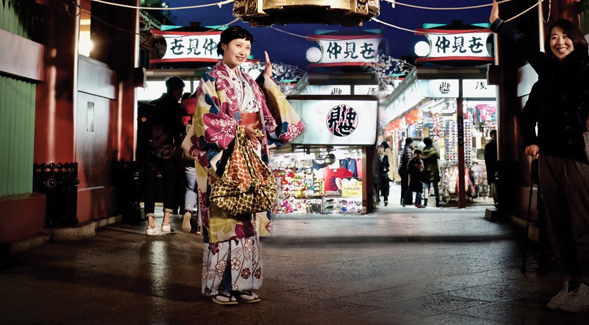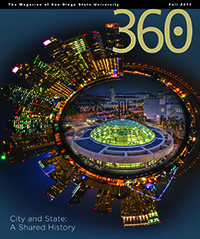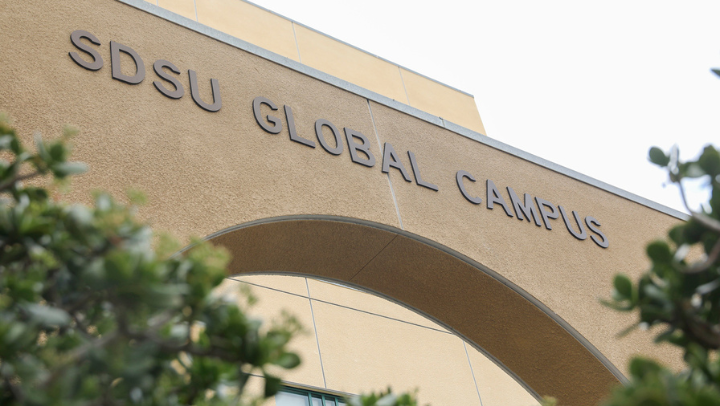Saying Sayonara to Regret
An alumnus makes up for a missed opportunity to study abroad.

“For the most part, we witnessed a health care system that operated more efficiently and humanely than our own.”
This story appears in the fall 2017 issue of 360: The Magazine of San Diego State University.
Let me start with a confession. When I was a student at San Diego State University, the notion of studying internationally seemed about as realistic as studying aboard the International Space Station. I thought I was too poor to make ends meet, too busy to spare the time and too lazy to research it all that closely.
So imagine my surprise a decade after graduating to find myself returning to SDSU to write about … international education. A funny thing happened as I spent my work days interviewing current Aztecs about their perspective-altering study abroad experiences—I began to feel pangs of regret. What, exactly, had I missed out on?

Then I received a serendipitous offer: the chance to co-lead a spring break study abroad program to Tokyo. During the nine-day program, I would be responsible for the safety and well-being of 40 College of Health and Human Services (CHHS) students. It’s not often you get a chance to right a past regret. Could I really say no?
Stark differences
When traveling to another continent, you expect differences in language or architecture or food to be the biggest drivers of culture shock. But once in Tokyo, it was the little things. The remarkable cleanliness of the densely packed city. The omnipresent surgical masks. The sight of unlocked bikes lining the sidewalk that are—incredibly—never stolen.
Every night, I ventured out alone on the city’s tangled web of Metro lines just to observe. I witnessed the mass of humanity converging upon the dazzling Shibuya Crossing. I studied the scores of suit-clad businessmen heading home after a late happy hour in Ginza (probably drinking with their bosses, I was later informed).
But I found observing everyday social norms most fascinating. Americans think of Japan as very Westernized—and in many ways it is—but stark differences reveal themselves once your eyes adjust to the neon glow.
“Everyone here follows the rules to a T – like how they all walk to the left side,” marveled Olivia Carrillo, a speech language and hearing sciences senior. “To me, that was really interesting. There’s this collective culture where everyone follows the same rules. In the United States, we all want to be individuals.”
The Metro provides another example of this collective compliance: When commuters forcefully push their way onto a packed (and I mean packed) train during rush hour, no one bats an eye. Do that in the United States, and someone might throw a punch. It’s no coincidence that Tokyo is one of the safest cities on the planet.
Better and worse
The students came with differing levels of international experience. A handful, including two military veterans who had been stationed in Asia, had traveled extensively. Most had not; one confided that this was his first time out of California.
All CHHS students have to study abroad, but the reasons my charges chose Japan ran the gamut. Some came for academic reasons, others for cultural fascination. One even eloped with her fiancé, marrying in Tokyo once the program concluded. Kinesiology senior Karlel Tinio told me he came for the anime.
“The pop culture just kind of screamed to me,” he said. “One of my friends called and said, ‘We’re going to Japan.’ Even though I was broke I just went for it.”
More than 30 undergraduate programs at SDSU require study abroad, and CHHS was the first college to make it mandatory for all majors. This push, combined with efforts to make students aware of study abroad scholarship opportunities, helps explain why SDSU ranks ninth in the nation for study abroad according to the Institute for International Education.
My program was part of a CHHS course that sends students around the globe every spring break to learn about how health care is administered in other countries. Along with my co-leader and a couple of lifesaving Tokyo-based guides, we shepherded students through a week’s worth of academic excursions, ranging from national health center visits to a lecture on traditional Kampo medicine, and cultural activities (the Judo lesson was a favorite).
For the most part, we witnessed a health care system that operated more efficiently and humanely than our own. But on the finely manicured grounds of the Imperial Palace, we met three activists with disabilities from the Japan Barrier Free Association. With the blooming cherry blossoms as a backdrop, they described their struggles for acceptance and legal accommodation in a society where they remain largely shunned and marginalized.
“It was a little shocking,” admitted kinesiology senior Jina Oliphant. “We have laws to accommodate the disabled community, but it feels like Japan is just taking its first step through that door.”
It was an important reminder that, in this place that can feel perfect, many things are not. That’s part of the study abroad lesson, too. When we immerse ourselves in other cultures, both the beauty and the warts are revealed. This new perspective inspires a mix of emotions—frustration over what can be better back home, and appreciation for what we have.
Another confession: The younger me could have used a little of both.



